任光:从越乡走出的“民族的号手”
●林丹枫
任光:从越乡走出的“民族的号手”
●林丹枫
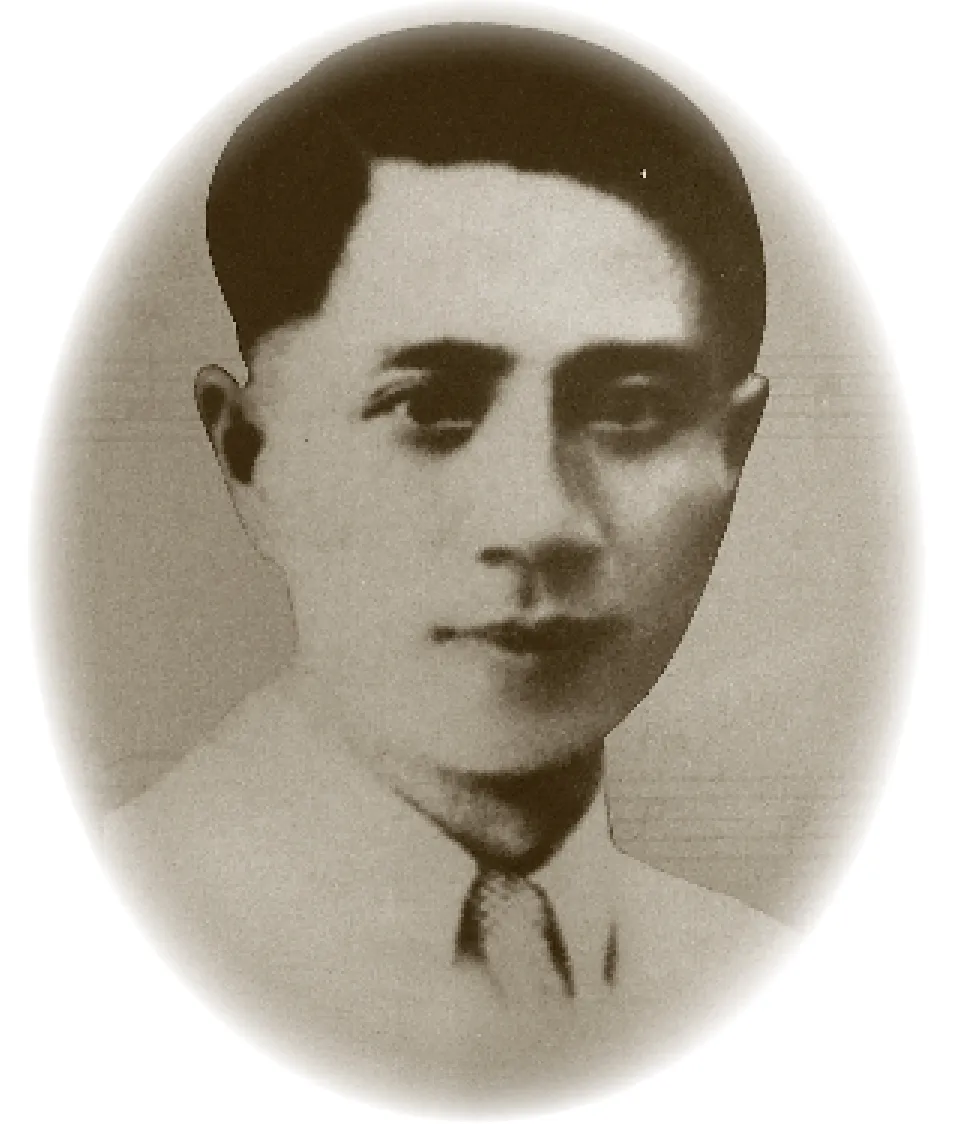
任光—民族的号手Ren Guang, a composer who was honored as the bugler of the nation after he died in action in 1940.
“云儿飘在海空,鱼儿藏在水中……”优美的旋律,真切的情感,在革命年代风靡一时的《渔光曲》把人们带回到那峥嵘的岁月,缅怀这首歌曲的作者任光。
在越剧之乡的音乐沃土中成长
1900年,任光出生于越剧之乡浙江省嵊县(现嵊州市)城关镇东前街。在他的孩提时代,嵊县民间百姓的吹拉弹唱、民歌小调以及后来发展成越剧的“的笃班”已十分流行,浓厚的民间越音氛围和乡间先贤的影响,给了他最早的音乐熏陶。他入读嵊县中学时,已擅长拉二胡、吹铜号、弹风琴,被同学们称为“小音乐家”。
家乡的山水,故乡的越音,影响了任光的一生,在他以后的作品里留下了明显的印记。
任光先后就读于上海震旦大学、法国里昂音乐学院。1928年,任光辞别不愿来中国的法籍妻子回到上海,在百代唱片公司工作。不久,他结识了田汉、聂耳、冼星海、夏衍、蔡楚生等左翼文化人士,并参加了共产党领导的“左翼剧联音乐小组”、“苏联之友社音乐小组”等进步组织。抗日战争爆发后,任光在法国、新加坡、菲律宾等国家为饱受战争创伤的中国人民举办募款义演,发出了海外抗日救亡的先声。
革命的火炬点燃了他的创作热情,他在战斗中创作的一首首革命歌曲,鼓舞了千百万群众和抗日战士。
1941年皖南事变中,任光不幸被流弹击中牺牲。
任光与聂耳及《义勇军进行曲》
任光与聂耳初次相识是在1932年,那时聂耳还在一个合唱团里吹小号。任光凭着极其敏感的辨音能力,发现了聂耳的音乐才能,遂通过他人介绍,将聂耳吸纳到上海百代唱片公司音乐部,帮助自己从事收音、抄谱、作曲和教唱歌曲等工作,并且在不久聂耳即升任为音乐部的副主任,成了自己的得力助手。因任光毕业于法国著名的里昂音乐学院,专修音乐理论和钢琴弹奏,是一位造诣很深的音乐家,聂耳非常尊重和敬佩任光,他们一起共事,真诚地相互帮助、交往合作,建立了很深的友谊。聂耳深深地感激任光的知遇之恩,虚心向任光学习,并一直尊称任光为“我们的导师”。
人们都知道雄壮激昂的国歌《义勇军进行曲》是由田汉作词、聂耳谱曲的,却很少有人知道任光在《义勇军进行曲》诞生、传播中的重要贡献。
任光是首版《义勇军进行曲》唱片灌制人。1935年5月9日,任光组织了上海电通电影公司的盛家伦、司徒慧敏、郑君里、金山、袁牧之、顾梦鹤、施超7个演员唱《义勇军进行曲》(即《风云儿女》电影主题歌),第一次在百代唱片公司录音棚内录下这首版《义勇军进行曲》,并灌制了唱片。随后,他又将这唱片的录音转录到电影《风云儿女》的胶片中去。这是全球第一张《义勇军进行曲》的唱片,编号为34848b,现保存在上海国歌纪念馆中。这版唱片很快发向全国,《义勇军进行曲》迅速在长城内外、大江南北广为传播,成为一首激情燃烧、影响最广的抗日名曲。第一次灌制的唱片很快销售一空,后来任光又连续灌制了两次。据许多老同志回忆,那时的《义勇军进行曲》是一首战斗进行曲、游行集会的合唱曲,有力地推动了中华民族抗日救亡运动。
任光也是把《义勇军进行曲》介绍到国外的第一人。1937年7月任光在法国进修期间,担任了法国左翼文化组织“民众文化协会”委员,他组织了巴黎华侨合唱团,首次教唱《义勇军进行曲》,并多次在法国为救济国内难民举行募捐公演。1938年春季,在有42个国家代表参加的反法西斯侵略大会上,他指挥华侨合唱《义勇军进行曲》等抗日歌曲,一些国家代表听了这些抗日歌曲后赞扬说:“中国现代歌声中蕴藏着无限希望。”

左图 从越剧之乡走出的任光;右图 任光1911年就读的嵊县中学堂校舍。Ren Guang was from Shengxian, the birthplace of Yueju Opera in eastern Zhejiang. In the right is the middle school Ren Guang went to in 1911 in Shengxian.

人民音乐出版社出版的《任光歌曲选》A Selection of Songs by Ren Guang, published by Shanghai Music Press
1939年5月,任光离开重庆赴新加坡,在新加坡举办民众歌咏训练班,传播《义勇军进行曲》等抗战歌曲,并组建了华人革命音乐组织“铜锣合唱团”。该团多次登台演唱《义勇军进行曲》,致力于唤起新加坡、马来西亚、菲律宾等地海外华侨的抗日热情。《义勇军进行曲》在当时华人中已成为大家最熟悉、最富号召力的歌曲,推动了海外华侨支援国内抗日的爱国热潮。任光所作的《中国进行曲》被辑入《世界革命歌曲选》。
唱响抗日救亡的最强音
任光从法国回国后,即到重庆育才学校音乐组任教,他除了教钢琴、教唱歌等,还组织了教师合唱团,排练的第一个作品就是《黄河大合唱》。每晚在暗淡的桐油灯下,他亲自刻印蜡板,指挥排练唱歌,“风在吼,马在叫,黄河在咆哮”的歌声震荡着山城。
1940年7月,由周恩来亲自批准,任光加入新四军。因叶挺军长的热情邀请,任光来到安徽省泾县云岭新四军军部,被分配在战地文化服务处负责音乐工作。在新四军中,任光除继续创作新歌曲外,一个重要工作就是教唱《义勇军进行曲》。
任光在皖南云岭新四军军部很受欢迎,战士们亲昵地称他为“王老五”。他与战士打成一片,很快就创作出一批歌曲,成功地转型为军旅音乐家。任光穿上军装,白天下连队体验生活、教唱歌曲,晚上则专心创作,写出了反映连队生活的《擦枪歌》等歌曲,深受指战员喜爱。不久,他谱写的《别了,皖南》在部队唱响了,成了新四军东进的进行曲,这也是他流传下来的最后一首佳作。《义勇军进行曲》《大刀进行曲》《新四军东进曲》《打回老家去》等都成为全军将士“冒着敌人的炮火前进”的战斗动员令。
“皖南事变”爆发,任光在枪林弹雨中牺牲,年仅40岁。他的妻子徐韧被俘后也惨遭杀害。而这时候,他的《渔光曲》已成为延安新华广播电台最早采用的序曲。
动人的旋律回响在中华大地
任光牺牲后,《新华日报》发表悼念文章,誉其为“民族的号手”。他一生创作了上百首作品,成名作是电影《渔光曲》的主题歌。《渔光曲》由王人美主演并主唱。1934年6月,电影《渔光曲》在上海放映,连续上映84天座无虚席,创上海电影放映场次的最高纪录,主题歌《渔光曲》以哀怨的旋律、优美的抒情,倾倒了广大观众,“潮水升,浪花涌,鱼船儿飘飘各西东。轻撒网,紧拉绳,烟波里辛苦等鱼踪。鱼儿难捕租税重,捕鱼人儿世世穷……”的歌声响遍上海大街小巷。歌曲以越剧特有的委婉细腻的抒情风格和凄婉的曲调,描绘了渔民沉重的劳动和贫困的生活,很好地渲染和烘托了影片的主题。
1935年2月,《渔光曲》参加在苏联莫斯科举办的国际电影节,获得“荣誉奖”,成为中国第一部获得世界荣誉奖的影片。由于该片的成功,很快形成了电影要配上音乐才卖座的潮流,同时也奠定了任光在中国电影音乐史上的地位。
任光创作的《打回老家去》《抗敌歌》《大地行军曲》《别了,皖南》等歌曲,以刚毅、雄健的曲调,表现了中国人民抗日救国的坚强意志。此外,他还有一类直接由民间音乐素材改编和创作的歌曲,如电影歌曲《新莲花落》《新凤阳歌》《王老五》以及抗战歌曲《高梁红了》等,都富有生活气息和乡土风味。这些不同风格的歌曲,生动地表现了人民大众的感情,具有鲜明的时代感和民族风格。
任光还作有歌剧《洪波曲》《彩云追月》等民族器乐合奏曲若干首。其歌曲作品已辑成《任光歌曲选》,1982年由人民音乐出版社出版。
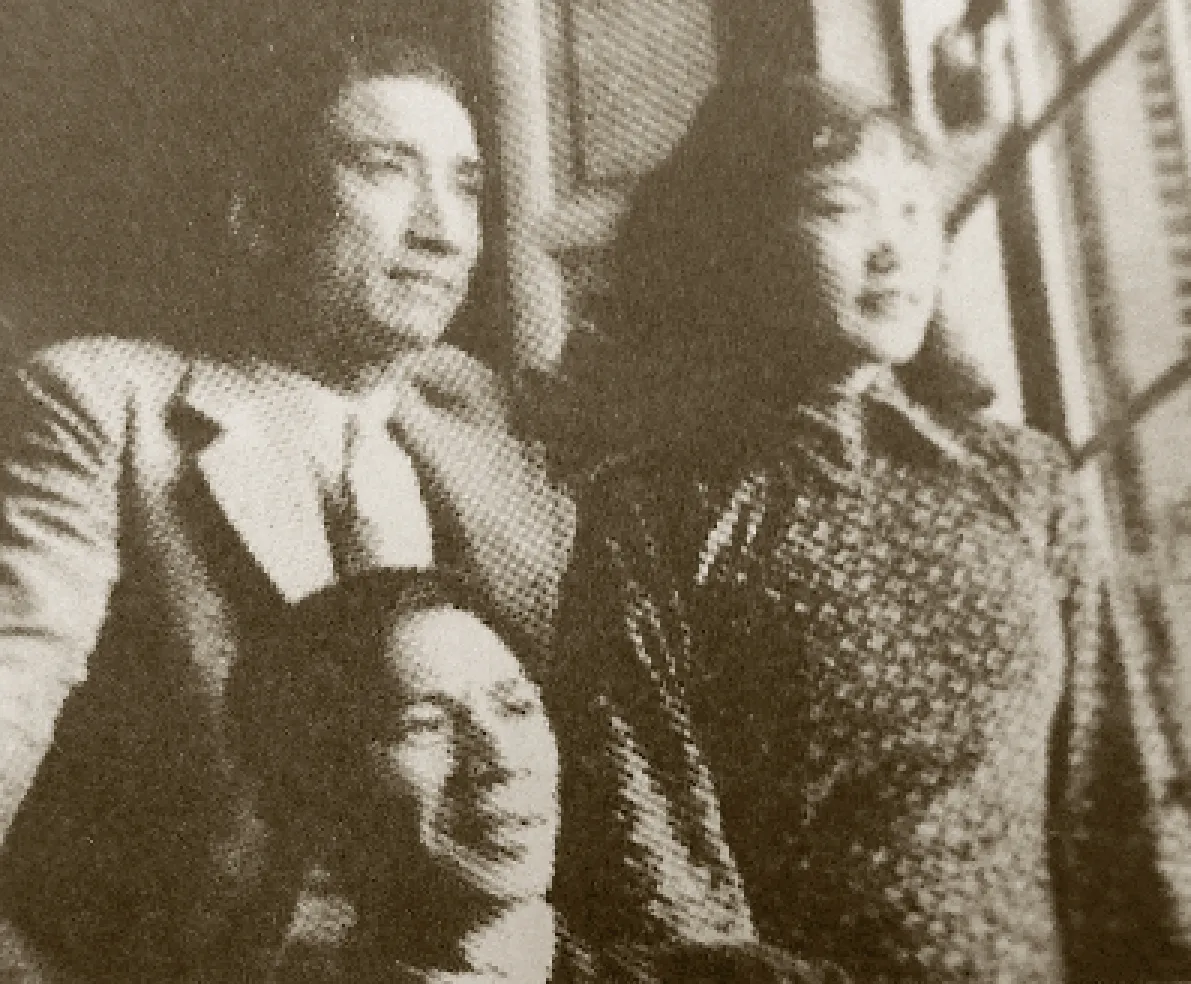
任光(前排坐者)和《渔光曲》演创人员安娥、蔡楚生在一起Ren Guang sitting in the front and filmmakers of Song of the Fishermen
为纪念这位革命音乐家,1996年10月,浙江省电视制作中心、绍兴有线广播电视台共同摄制六集电视剧《彩云追月》,用形象的电视形式把任光的一生记录下来。
2011年1月,在任光牺牲70周年之际,由安徽省新四军历史研究会、浙江省新四军历史研究会等单位共同摄制的四集人物传记片《民族的号手—任光》,在中央电视台黄金时段播出,介绍任光在音乐创作、爱国抗敌中作出的贡献。
民族的号手声震云天,革命音乐家任光的乐曲永远回响在中华大地!
Ren Guang: National Musician from Zhejiang
By Lin Danfeng
Ren Guang (1900-1941) was a musician and songwriter from Zhejiang. He is best remembered for Song of the Fishermen, a soundtrack he composed for a film made in 1934 and is still heard nowadays. And he is widely considered a revolutionary composer as he joined the New Fourth Army which was under leadership of the Communist Party of China and fought Japanese invaders during World War II. He died in Wannan Incident in 1941.
He was born in the capital of Shengxian County (the present-day Shengzhou, a county-level city) in eastern Zhejiang Province where Yueju Opera originated and has evolved into a national genre. In his childhood years, music and theater were a strong tradition in Shengxian. He picked up a lot from local musicians. While he wasin middle school, he was known as a teenage musician as he was able to play a number of musical instruments.
He studied in Aurora University in Shanghai and Lyon University in France. In 1928 he came back to Shanghai and worked for EMI Music. He made friends with a group of left-wing artists such as Tian Han, Nie Er, Xian Xinghai, Xia Yan, Cai Chusheng. He joined a left-wing league of playwrights and musicians. After China’s resistance war against Japanese invasion started in 1931, he staged fund-raising music shows in France, Singapore and Manila in support of the Chinese resistance movement. He was the first to make such efforts through music overseas.
Ren Guang met Nie Er in 1932 in Shanghai where Nie Er was a trumpet player in a band. Ren Guang recognized Nie’s talent and hired him to work as his assistant at EMI Music. Under the guidance of Ren Guang, Nie Er soon blossomed as a composer. Nie considered Ren as his mentor.
Ren Guang was also the first record maker of March of the Volunteers, now the national anthem of China. It is widely known that Tian Han was the lyric writer and Nie Er set the lyrics to music, but it is little known that Ren Guang made the first record on May 9, 1935 in Shanghai. Seven filmmaking artists from Diantong Films sang the song in the EMI studio. Ren Guang then copied the song to the film of Children of Troubled Times. The original record featuring 34848b as its serial number is now in the collection of Shanghai National Anthem Museum. The record was issued nationwide and the song spread like fire.
Ren Guang was the first to introduce the song to overseas audiences. While taking an advanced music course in France in July 1937, Ren Guang joined a left-wing cultural organization in France and served as a member of a committee. He organized a singing group composed of overseas Chinese in Paris. He taught the chorus to sing March of the Volunteers and the chorus sang the song many times at fund-raising events. In the spring of 1938, the chorus under the baton of Ren Guang performed this march and other Chinese songs for the anti-fascism congress in Paris attended by representatives from 42 countries.
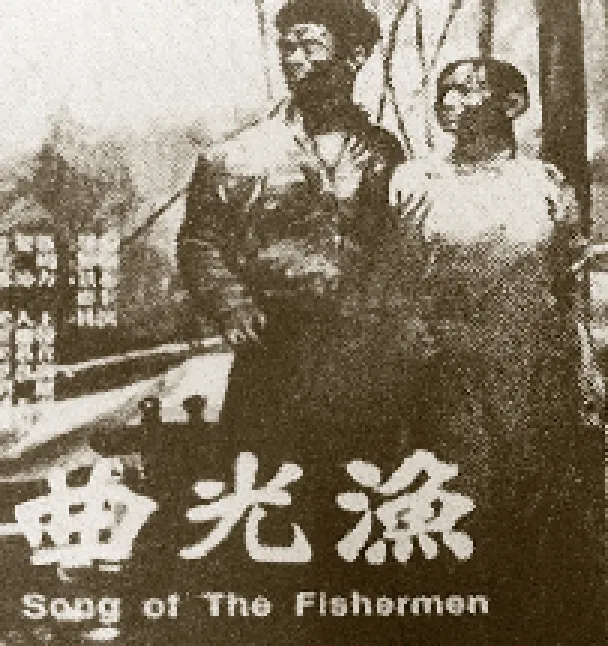
由任光谱曲、安娥作词的《渔光曲》轰动大上海。图为《渔光曲》电影海报。A poster of Song of the Fishermen, a cinematic sensation released in 1934
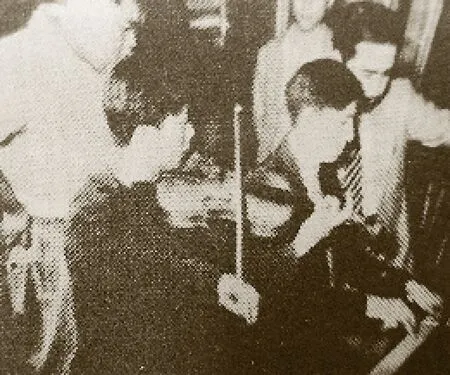
任光与聂耳(左二)进行歌曲合奏。Pianist Ren Guang and violinist Nie Er perform together.
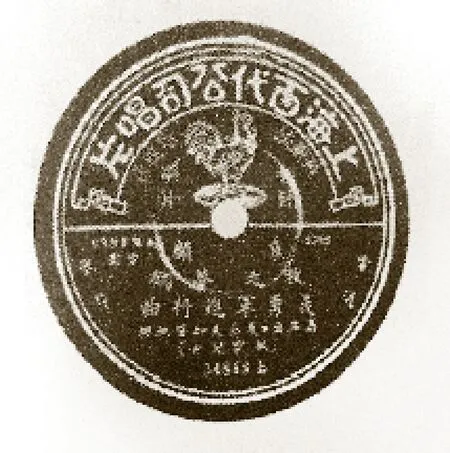
由任光录制、具有重大的历史意义的首版《义勇军进行曲》唱片,编号为34848b。The original single gramophone record of March of the Volunteers, serial number 34848b, recorded by Ren Guang and released in 1935
In May 1939, Ren Guang arrived in Singapore. He was active in resistance undertakings against Japanese aggression. He taught songs to local singers and organized a chorus to sing them. March of the Volunteers was one of these songs.
Ren Guang joined the New Fourth Army in July 1940. Army Commander Ye Ting invited the composer over to the headquarters in Jingxian County in Anhui. The composer was in charge of the music work at the battleground cultural services. He composed songs for the army and taught soldiers to sing March of the Volunteers.
After his death, Xinhua Daily printed an obituary praising him as “a bugler of the nation”. In his short lifetime, Ren Guang composed more than 100 songs and most of them were revolutionary. In February 1935, Song of the Fishermen was screened at an international film festival in Moscow and won a prize. It was the first international film prize China had ever won. The film’s success set a new trend: a film must have a theme song for a box office success. Historians of Chinese filmmaking agree that Ren Guang made the trend.
Of the songs Ren Guang composed, many were about Chinese resistance against Japanese aggression. These songs were sung everywhere during the war. In October 1996, a six-episode series, jointly produced by Zhejiang Television Production Center and Shaoxing Cable Radio and TV Studio, was screened in honor of the composer.
In January 2011, a four-episode documentary was screened on CCTV in commemoration of the 70th anniversary of the death of Ren Guang. The documentary was jointly made by Anhui Institute for the History of New Fourth Army and its Zhejiang counterpart.
——李海青

